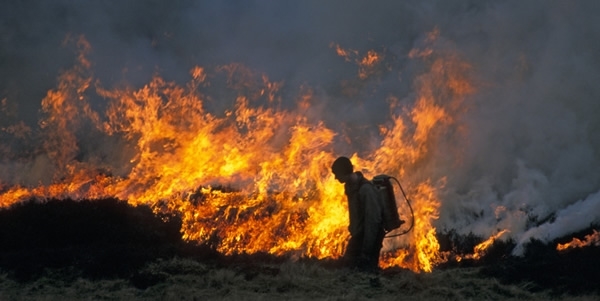
SPEAKING at an All-Party Parliamentary Group event organised by the GWCT in Westminster yesterday, Simon Thorp, chairman of the England and Wales Wildfire Forum, says we need to be “braver” and “bolder” in accepting that fire management is part of wildfire control and sound conservation advice.
Mr Thorp spoke openly during a stimulating debate on Wildfires: Mitigating the risk. The debate was on the same day a blaze broke out near Saddleworth Moor in West Yorkshire and on Arthur's Seat in Edinburgh.
He stated that we need to be realistic that wildfire isn’t just an issue facing southern Europe.
“The problem is coming north, we can’t ignore it and it won’t go away,” he said.
“We need to manage the land in the face of a year-round threat. There are risks of fatalities, risks to public health, biodiversity and carbon storage.”
“Land managers have the skills and capacity to manage the situation. There's a tendency to be too hands off - we need to be bolder. We need to be brave and say that wildfire management is part of sound conservation advice.
“This clarity would help management planning that aims to reduce the amount of damage resulting from wildfires. Fire Groups already exist in many areas, and with some extra support from the key government departments (Home Office, Defra and the Cabinet Office), they will be able to help with wildfire mitigation planning; the groups could also provide communication about wildfire risks to the general public.”
He added that better engagement would help deliver the four requirements needed to reduce the risks of wildfires; integrated support from government, warning of wildfire high risk, a risk-assessment approach and provide guidance for wildfire mitigation options.
Joining him on the panel was Professor Rob Marrs, an expert in moorland ecology and environmental science at the University of Liverpool, and Clifton Bain, a director at the IUCN UK Peatland Programme.
Mr Bain highlighted the role of healthy bogs in wildfire control, noting that even bog restoration projects should adopt good fire management practices, especially in the early years.
In common with the other speakers he said: “Restoration of peatland is mainly about bringing the water table back up, and once re-wetted, these bogs are part of the wildfire control system for moorland areas.”
He noted that while the IUCN peatland programme does not advocate burning as a way of speeding the restoration of bogs, there is a need to improve the scientific work on restoration of bogs and long-term monitoring as peatlands are not identical.”
Rob Marrs, who recently published findings of a 60-year study on prescribed burning in Teesdale, explained the importance of good factual evidence in deciding on the beneficial role that shooting and farming management can have in reducing wildfire risks.
He commented: “Controlled burning will not stop wildfires but makes firefighting easier and safer, reducing damage and encouraging faster vegetation recovery after fires. While this controlled burning will inflict some damage on the moorland system, I feel that some damage here is better than substantial wildfire damage.”
The thought-provoking questions raised by MPs, journalists, and countryside organisations led Sir Nicholas Soames, who chaired the event, to state that this was a topic of national importance that needed action at all levels.
Notes to editors
The Game & Wildlife Conservation Trust – providing research-led conservation for a thriving countryside. The GWCT is an independent wildlife conservation charity which has carried out scientific research into Britain’s game and wildlife since the 1930s. We advise farmers and landowners on improving wildlife habitats. We employ 22 post-doctoral scientists and 50 other research staff with expertise in areas such as birds, insects, mammals, farming, fish and statistics. We undertake our own research as well as projects funded by contract and grant-aid from Government and private bodies. The Trust is also responsible for a number of Government Biodiversity Action Plan species and is lead partner for grey partridge and joint lead partner for brown hare and black grouse.
For information, contact:
Eleanor Williams
Telephone: 07592 025476
Email: press@gwct.org.uk